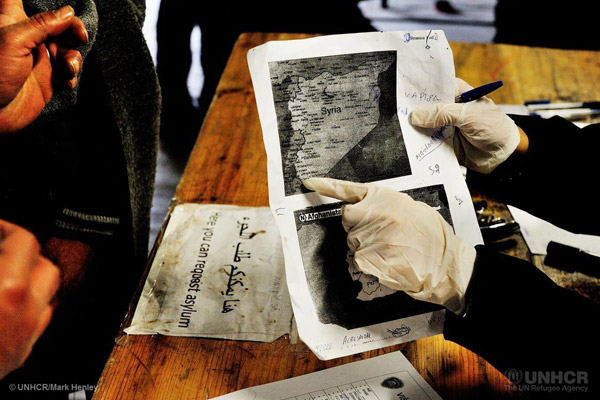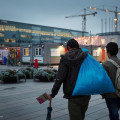“Securitization is not the answer, it’s largely part of the problem.” A chat with Pamela DeLargy, Special Advisor on migration at the UN
Pamela DeLargy is currently the Special Advisor for the UN Special Representative on Migration, Peter Sutherland, and has previously worked as Representative for the UN Population Fund in Sudan. Asylum Corner met her to discuss the general situation of migration in Europe and the latest developments of the EU migration policy.
Asylum Corner: What is today’s main focus of the UN Special Representative on migration?
Pamela DeLargy: Three things are happening in the Special Representative Office right now. One is the push to have migration as part of the Sustainable Development Goals, which has been a success in itself. Now the next step is to identify appropriate indicators for the migration related goals.
The second responsibility of the Special Representative is to convene the Global Forum on Migration and Development [that took place last 14-16 October in Istanbul], which keeps that discourse going between governments and between governments and civil society, and encourages them to rethink migration as part of the development process, and to look more carefully and analyse better how human mobility affects the place of origin, the place of transit and of destination.
Thirdly, the Special Representative is currently also very engaged with how to deal with the current migration environment. He is very concerned with this whole “globalization of intolerance”, as the Pope called it, and he is trying to help influence shifts in both policies and perceptions about migration, since the political environment and the complications that policies are causing in terms of humanitarian effects seem quite dramatic. We are witnessing mistreatment of people, violations of basic human rights, violation of human rights rationalized with legalistic attention to immigration law. It is a kind of moral crisis.
AC: What is the stance of the UN Special Representative towards the European Union migration policies, which seems to embrace a securitarian approach rather than a humanitarian perspective?
PD: The Special Representative has been very clear in maintaining that securitization is not the answer. In fact, securitization is largely part of the problem. The level of energy, thought, and resources going into finding solutions on how to manage migration dynamics compared to the level of resources going into border security issues is very small. The attention to how to integrate is very small compared to the attention dedicated to border and security issues. And that in the long run is a missed investment, an investment in the wrong thing. If we want the outcome to be peaceful social cohesion, integration of people, economic contribution, then we are investing in all the wrong things.
AC: It seems there is quite a contradiction between the EU discourse on migration and development and the tough EU border control policy that Brussels is putting forward…
PD: This is very interesting and people are finally talking about this. If you look right now at the economic situation and how many people are dependent on remittances in their home countries, it becomes clear that if the remittances do not come, more people will have to leave. So it almost does not matter if you are facing political persecution or not in that regard. If you start deporting people, which will cause gross violation of rights, than you are contributing to those departure decisions.
What is interesting is that despite all the debate in the EU institutions there’s a surprisingly small amount of actual analysis, and so the policies are based on assumptions that may or may not be correct. For instance, in the relocation policy there is also a section on providing information and awareness to potential migrants about the danger of the migration journey. This is assuming that they do not know the dangers, but in fact they know the dangers very well, since they all have friends or relatives that have drowned or have been raped along the way.
In classical migration theory there used to be concepts like push and pull factors. In forced migration, the push factors are considered to be dominant; but now there is confusion in that. The Home Secretary in the UK did not even want to provide a British ship for the Triton rescue program because she thought it would attract more people, which is a very bizarre way of thinking about these things. I believe many people think this way, they just do not go quite that far to say it openly. So, the laws discussed and negotiated end up being the lowest common denominator, representing what all the Member States can agree on.
AC: What is your opinion about the EU determination to focus on fighting the smugglers?
PD: The smugglers are only providing services, there is a demand for their services and they are just offering them. Some smugglers are very bad and exploitative but some others are just providing the services that people request. Why do we think of Oscar Schindler as a good person, or people that smuggled children out of Germany during Second World War, and we call them heroes, but we think of all these smugglers who are bringing Africans and Syrians as bad people?
The fight against the smugglers is a securitization move, and securitization goes hand in hand with the criminalization of the migrants. We have made them into criminals. Because it is “illegal” to come without a visa, and these words have a major impact on the popular imagination, especially since most media boost such ideas. It is a fine line between calling people “illegal” and calling people “criminals”, and it is confused in the average person’s mind.
In general, I think the European countries are facing a big dilemma: Europe as a whole sees itself as the human rights champion, humanitarian champion, champion in women’s rights, and sells that abroad. We are victims of our own marketing. If the British go into Sudan and talk about human rights and the importance of free speech, then they should not be surprised if a bunch of guys from Darfur show up in Calais trying to get into the UK. They do that because they have always been taught that Britain is the beacon of respect for rights. It should be a compliment for the British people that there are people in Calais who want to enter Britain. It should be a compliment to Europe if people come here because this is not only a place of safety but is a place where you can be yourself, where you can educate your children, you can be free. We are the best marketers of freedom but then when people come and say “I wasn’t free and now I want to be free”, then we get confused because we never sincerely promised that. We are very confused, aren’t we?




